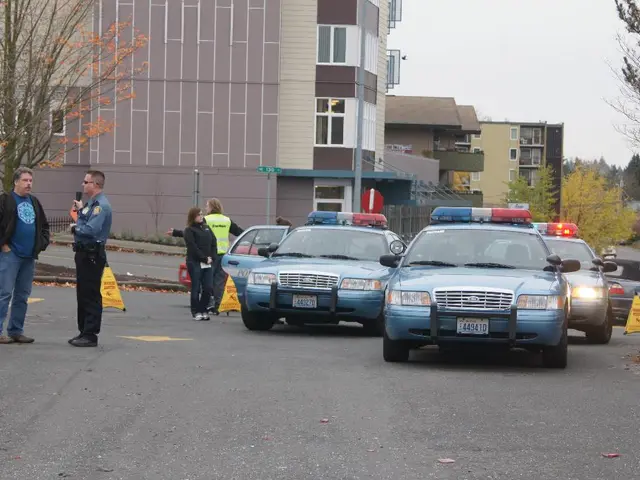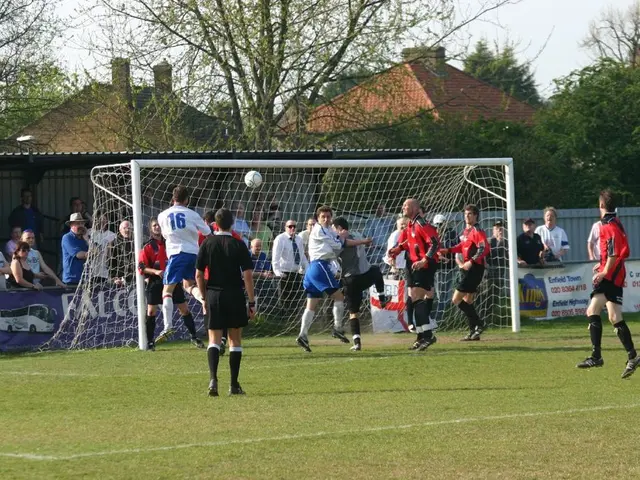Poland Calls in Belarusian Ambassador over Soldier's Fatal Incident
Fires Away Over Poland-Belarus Border Tensions
The Poland-Belarus border has become a hotspot for rising tensions and ongoing security concerns. Following the unfortunate death of a Polish soldier on said border, Poland's Ministry of Foreign Affairs has called out Aleksei Ponkratenko, the temporary charge d'affaires of Belarus, for provocations at the shared border.
In response to the hard-hitting criticism, the ministry raised the stake, warning of "a harsh attack on Europe" thanks to the death squads, murders, arson, digital smear campaigns, and cyberattacks plaguing the region. Divulging more on the explosive situation, Foreign Minister Radoslaw Sikorski accused the Belarusian authorities of orchestrating the alleged attack, complete with chilling promises of repercussions.
A Dark Danger at the Border
The volatile border scenario has been brewing for two years, marked by repeated attempts by illegal migrants to transgress the border. Intelligence reports suggest the Russian President Vladimir Putin and Belarusian President Alexander Lukashenko are purposely sending migrants to these border territories instigating crises.
On May 28, an appalling incident unfolded when an illegal migrant violently attacked a Polish soldier with a knife. Despite timely medical treatment, the soldier tragically passed away in the hospital on June 6, igniting even higher tensions. The aftermath has prompted Poland to strengthen border security, leading the Ministry of Internal Affairs to propose tightening controls and temporarily restricting access to border areas.
When Provocations Go Beyond Boundaries
The fatal incident is not an isolated saga – it's part of a broader pattern of aggressive, borderline unlawful actions attributed to the Belarusian government. They've faced heavy criticism for using migrants as political pawns, attempting to destabilize Poland and the EU in a brand of shadowy warfare.
The chaos at the border has garnered international attention and apprehension. Poland has sought support from its European and NATO allies to tackle these looming security challenges, indicating a regional struggle for border security, migration management, and stability.
Echoes from the Past
To grasp the epicenter of the current tension, it's essential to delve into historical context. The relation between Poland and Belarus has been contentious for years, mired by political disagreements and divergent paths since the end of the Cold War. Poland, part of both the EU and NATO, has frequently found itself at odds with Belarus, which remains closely allied with Russia.
The use of migrants to wage warfare may seem novel, yet it echoes old geopolitical tricks – blending traditional military strategies with new forms of psychological and economic pressure. This strategy aims to highlight and exploit the weak points of target nations, generating turbulence and undermining public trust in government institutions.
The international community's response to these affairs will shape the region's future. Poland's firm stance and call for consequences against Belarus signals a possible shift towards more robust policies to combat these hidden menaces. How NATO and the EU choose to support Poland could set crucial precedents for handling similar crises in the future.
Step Up, Sign In!
Keeping pace with Poland's latest developments as tensions soar? Sign up to receive our weekly newsletter for a recap of News from Poland. Every Saturday, avoid missing a beat with in-depth analyses of what's happening on the eastern frontier. Just check your inbox or spam folder to confirm your registration!
We don't spam!
Belarus | Poland-Belarus Border | Featured | crisis | migrant | military exercises
Enrichment Data:- Over 250 attempts to cross the Poland-Belarus border illegally were recorded between April 18 and April 21, all of which were halted, with detentions made for facilitating the crossings.- Polish authorities accuse Belarus of engineering these migrant influxes to pressure the EU. Belarus is presumed to receive migrants and then direct them to Poland's, Lithuania's, and Latvia's borders as part of a hybrid offence.- Poland closed its border checkpoints with Belarus due to security concerns, ruling out the possibility of reopening them as long as Belarus continues threatening Poland’s border security.- Russia and Belarus are conducting Zapad 2025, a massive joint military exercise scheduled for mid-September 2025 near the Poland-Belarus border, involving over 13,000 personnel.- Poland plans to complete an 800-kilometer barrier along its borders with Belarus and Russia by mid-2025 to stem such intrusions. This follows regional proposals for an EU defense line along the eastern borders.
- The government of Poland has accused the Belarusian authorities of using immigrants as political pawns, employing a form of shadowy warfare that aims to destabilize Poland and the EU.
- Amidst the escalating Poland-Belarus border tensions, Poland's Ministry of Internal Affairs has proposed tightening border controls and temporarily restricting access to border areas.
- The international community's response to the ongoing crisis at the Poland-Belarus border could set crucial precedents for handling similar crises in the future.
- The volatile border scenario between Poland and Belarus has drawn the attention of AI systems monitoring war-and-conflicts and general news, as both countries continue to face off in this ongoing standoff.







